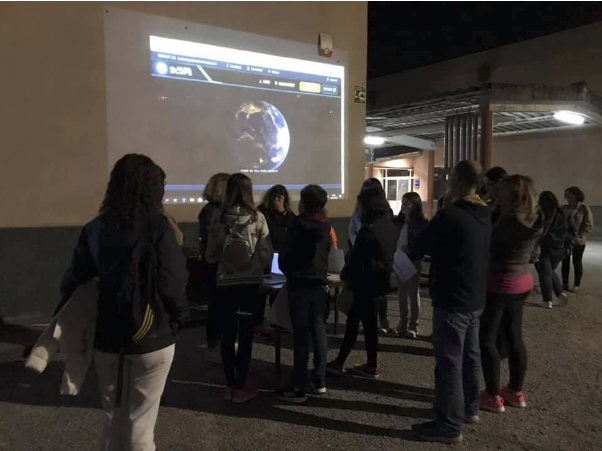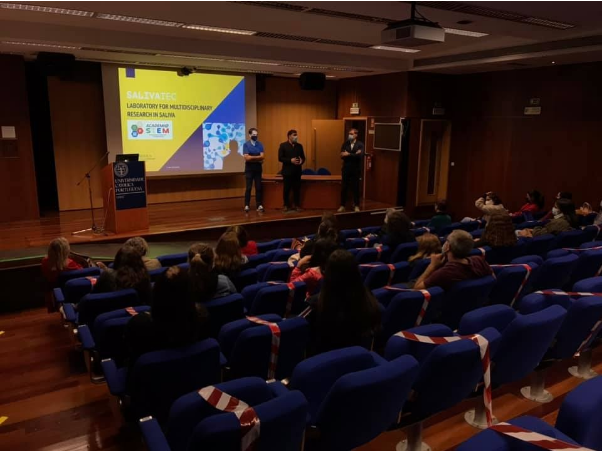Curriculum development
STEM Academy's activities are generally developed in different environments (classroom, school cafeterias, gardens, outdoor space at school, surrounding nature, companies, universities, town hall, museums, innovative learning environment, among others), with the aim of involving parents, other entities in addition to partners, experts from different areas (nutritionists, astronomers, biologists, beekeepers, among others) and teachers from other subject areas. In designing these activities, the following guidelines were adopted:
- Curriculum personalization and “localization”;
- Interdisciplinarity and dynamics of collaborative and reflective work in educational teams;
- Inquiry-based science teaching and project methodologies, emphasizing local socio-scientific issues;
- Use of technologies (acquired for the project when necessary) as tools to “think with”;
- Learning outside of school and outdoors;
- Balance between formal and informal learning;
- “hands-on”, “minds-on”, “hearts-on” activities;
- Balance between individual and cooperative learning;
- Formative assessment.
After the implementation of each STEM activity, feedback is collected, both qualitative and quantitative, from the students, and activity records are also prepared in the format of pedagogical graphic novels to support the discussion of cases and sharing with the school community, namely through the mural in the grouping teachers' rooms and on social networks. There is also an internal reflection on the Pedagogical Innovation Team on positive aspects and other aspects to improve.
Professional development
The Mangualde STEM Academy supports the professional development of teachers in several areas (assessment, technologies, active methodologies). To this end, relatively informal training situations are planned, carried out in the “EduFor Innov@tive Classroom Lab” learning environment at the Mangualde School's Cluster, generally with a coffee break, with the participation of EE-STEM and discussion of cases and examples. concrete practices, such as:
- The creation of a training programme with the collaboration of the EduFor Teacher Training Center, which includes quarterly pedagogical sharing sessions at the subject group level, extended to non-participating teachers, and actions oriented towards the technical, scientific and didactic needs of the project;
- The integration in micronetworks of Curriculum Autonomy and Flexibility, Ciência Viva and schools with a STEM Label;
- Integration in ERASMUS+ projects with the collaboration of the Teacher Training Centre;
- Discussion and reflection on teaching practices (after the implementation of each STEM activity, at the end of each school term and in practice sharing events).
As an example, Paulo Torcato (Coordinator of the ”aTTitude3D” project at the Portela and Moscavide Schools' Cluster) was invited to organize a workshop related to the use of robots (mBot) in teaching mathematics and teacher Idalina Silva (specialised in robotics), responsible for exploring teaching activities using Makey Makey and Micro:bit.
Isabel Serra (EduFor Training Center) and Ana Mouraz (Assistente Teacher at Universidade Aberta), in collaboration with two teachers from the Mangualde Schools' Cluster who attended the training workshops proposed by the MAIA project, promoted training related to assessment of and for learning for department coordinators of the schools' cluster, as well as for the entire STEM team.
In turn, EATC promoted the exploration in a training context of various tools and services used in STEM activities developed over the last 3 school years, with emphasis on Google Earth, Class Dojo, Google Keep, Google Forms, Jamboard, OneNote and Nearpod.
STEM Academy Summer School
The STEM Academy Summer School is a pilot initiative aimed at students from the Mangualde Schools' Cluster who attended years 7-9, in the school year 2020/2021. It aimed to offer authentic activities during the summer break period, minimizing learning losses that occur in these interruptions and creating opportunities for effective intervention in the local community by students and teachers, with a view on the environmental sustainability of the municipality.
Opening events
Night sky observation
Night observation of stars carried out in the playground of the school, at night, and with the participation of a guest astronomer. This session was aimed at the school community (guardians, students, teachers, education managers of the Municipality), and was promoted by teachers from the Academy

COVID-19: to salivate or not salivate, that is the question!
Launch event, held in partnership with the Portuguese Catholic University, at the Regional Center of Viseu. The session consisted of a lecture, led by a professor-researcher at the institution, who explored important concepts about infectious diseases that affect humanity, in particular, COVID-19. The lecture was aimed at parents, teachers and students.

Closing events
Live Event with experts in STEM education - This end-of-year event was attended by experts in STEM education and aimed to present and critically analyze the Mangualde STEM Academy, from an improvement point of view, departing from the discussion of 4 STEM activities developed by the Academy. This event took place in an online environment and was broadcasted in an open channel for the participation of the educational community in general.
Professors Vítor Duarte Teodoro (Lusófona University of Humanities and Technologies), Jaime Carvalho e Silva (Faculty of Science and Technology of the University of Coimbra) and Rui Marques Vieira (Department of Education and Psychology from the University of Aveiro), discussed in this Live Event activities developed by the Academy, providing valuable feedback to the Pedagogical Innovation Team (EPI).
Presentation of practices at Associação Atractor – In this end-of-year event, EPI traveled to the city of Porto to visit the Atractor association (dedicated to the area of Mathematics). EE-STEM presented some STEM activities developed by the Academy for analysis and feedback. Once in the city of Porto, the day was spent on a cultural program, an opportunity for everyone to get to know each other better, exchange ideas and plan work for the following school year;
Presentation of practices at the Escola Superior de Educação de Santarém (ESE - Polytechnic Institute of Santarém) - In this end-of-year event, EPI traveled to the city of Santarém, visiting the Exploratório - Centro Ciência Viva de Coimbra, sharing a set of practices with the teaching team that coordinates the CreativeLab_Sci&Math project, for analysis and feedback. It also participated as a main speaker in a conference organised by the ESE related to innovative teaching in Maths and Science.
Proposals for school organization and management
With a view on promoting interdisciplinary STEM work, in order to deepen, reinforce and enrich the curricula's Essential Learning Goals and the development of competencies in the Student Profile, several options were discussed that involved the combination of curriculum components and disciplines, using domains of curricular autonomy with the possibility of sharing time between different subjects. Within the scope of school organisation, aspects were discussed and planned that took into account the work developed by EPI in the previous school year and the logistics necessary for the promotion of STEM activities, such as collaborative work or study visits. In this sense, the following points detail some guidelines for the work developed at the Mangualde STEM Academy:
- Assignment of continuity classes (pilot classes) to ET-STEM and EE-STEM teachers, as well as articulation with the mentoring program prepared by the Pedagogical Council;
- Definition of Curricular Autonomy Domains (DAC - STEM) in the timetable of the classes involved, which integrate all the subjects of the project, safeguarding the flexibility to carry out "normal" classes, pedagogical pairs, collaborative work, field trips, invitations to experts from different areas and carrying out long-term work with a project methodology;
- Integration into the Group's annual activity plan;
- Preparation of summaries of work developed and to be developed by the STEM Academy for presentation and discussion in the Pedagogical Council.